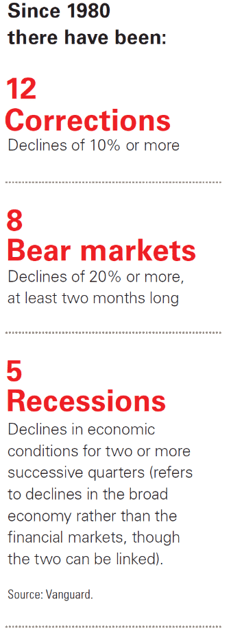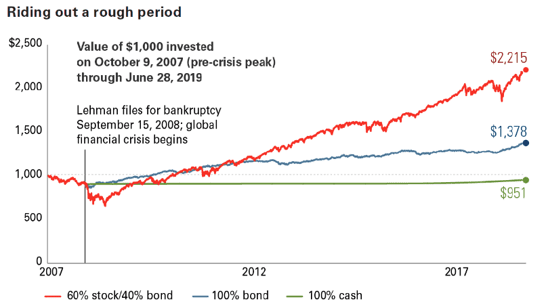For prepared investors, market downturns can represent great opportunity
Nearly everywhere you turn, from friends and colleagues to cable news shows, you can find someone with a strong opinion about the financial markets. People will often use specific terms such as correction or bear market to render judgments about the direction of markets, especially when market performance is choppy or trending down.
Is it worth getting concerned when markets stop or even reverse their upward advance?
To answer that, it’s important to realize that downturns are not rare events: Typical investors, in all markets, endure many of them during their lifetimes.
Even knowing this, it can be unsettling to witness the decline of your portfolio during one of these events. After all, that account balance is more than a number—it represents very important personal goals, such as the ability to retire comfortably or to provide a quality education for family members. When market conditions place those goals in jeopardy, you may feel compelled to do something, such as sell most or all of your investments. You may assume that converting to cash will give you a better long-term result than staying invested.
But such action would shut you out of the strong recoveries that have historically followed market downturns. The answer is to come up with a game plan before the next market pullback, so you’re well-positioned to try to take advantage of the opportunities that follow. What’s more, you’ll probably know what to expect as markets cycle through their phases, so you can tune out messages that don’t help your strategy.
It’s worth noting that not all financial declines are the same in length or severity—for example, historically speaking, the global financial crisis and Great Recession of 2008–2009 was an extreme anomaly. As challenging as that event was, it was followed by the longest stock market recovery in U.S. history.
 Sources: Vanguard calculations, using data from FactSet. All data as of June 28, 2019.
Sources: Vanguard calculations, using data from FactSet. All data as of June 28, 2019.
Notes: This is a hypothetical illustration. Balanced portfolio is represented by 60% S&P 500 Index and 40% Bloomberg Barclays U.S. Aggregate Bond Index; bonds are represented by Bloomberg Barclays U.S. Aggregate Bond Index; and cash is represented by Bloomberg Barclays U.S. 3-Month Treasury Bellwether Index. Past performance is no guarantee of future results. The performance of an index is not an exact representation of any particular investment, as you cannot invest directly in an index.
1 Lu Wang, “The Bull Market Almost No One Saw Coming,” Bloomberg Businessweek, December 15, 2019, https://www.bloomberg.com/news/articles/2019-12-15/the-bull-market-almost-no-one-saw-coming, accessed on December 19, 2019.
Short-term volatility: What’s your move?
The financial markets don’t like bad news. The current coronavirus outbreak is no exception, and many investors are tempted once more to “do something.” But in times of volatile markets, the best move of all for long-term investors is often no move at all.
While they’re not exact parallels, the stock market responses to the SARS coronavirus in 2003 and the Zika virus in 2016 offer useful lessons. In both cases, investors who sold on bad news and falling prices missed significant rebounds that very shortly had stock markets back to prior levels.
There’s no guarantee that today’s market will play out the same way; stocks have also taken days, months or longer to regain losses. But remember that knowing when to get back in is just as hard as knowing when to get out. The investment strategy I’ve mapped out for you is a long-term plan based on your personal goals and circumstances. Should those change, let’s talk about whether an adjustment to your strategy is warranted.
Best defense: Making a plan and sticking to it
We can develop a plan now that prepares you and your portfolio for financial system shocks, whenever they happen to occur. That means focusing on the factors of your investing strategy we can control (including things such as asset allocation and costs) and not worrying about those things out of our control, such as downturns in the markets and economy.
In the meantime, remember that bearish market conditions—while inevitable—don’t last forever. As a savvy investor, you can ignore short-term pullbacks of the market (and any commentary that might cause you to veer off course) and remain committed to achieving your long-term vision.
Downturns come and go. The results of a well-designed and faithfully followed plan, on the other hand, can serve you the rest of your life.
Past performance is no guarantee of future results.
Investments in bonds are subject to credit, interest rate, and inflation risk. High-yield bonds present higher credit risk than other types of bonds.
Mid and small-capitalization stocks historically have been more volatile than large-cap stocks.
All investing is subject to risk, including the possible loss of the money you invest. Be aware that fluctuations in the financial markets and other factors may cause declines in the value of your account. There is no guarantee that any particular asset allocation or mix of funds will meet your investment objectives or provide you with a given level of income. We recommend that you consult a tax or financial advisor about your individual situation.
Securities offered through Geneos Wealth Management Inc. Member FINRA/SIPC.



